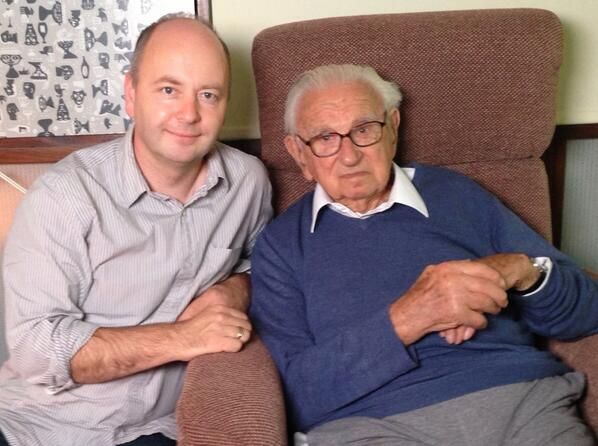Global Ethics and Compromise: Remembering Nicholas Winton
I first met Sir Nicholas Winton when he had reached the mere age of 87. He was curious to learn about the UK Holocaust Centre, which our family had opened in Nottinghamshire. Winton was intrigued to learn that a non-Jewish family established the center, which resonated with his own ethics, as a Holocaust rescuer who saved 669 Jewish children by organizing the Czechoslovakian Kindertransport.
My next encounter was a few years later at the Kindertransport Reunion in 2000, when he had reached the ripe old age of 91. For some reason the organizers saw fit to place 'Nicky' and me on the same panel. At the time I had recently completed my PhD and was feeling sharp and maybe a little smug. I didn’t think being on a panel with Sir Winton would be intimidating , but whatever mistaken illusions of grandeur I may have had come crashing as he mastered the floor with his wit, in front of his adoring fans of 70-year-old 'kinder' in the audience. It was a masterpiece of eloquence, modesty and wisdom, which left me humbled and educated.

The interview was short compared to the 53,000 testimonies in the Visual History Archive, and included a repeat of the debate about why archives do not serve the interests of the present and future. His testimony also contained several reminders of what he considers the way to avoid conflict and genocide: 'standard ethics and compromise.’ When I pushed him he said that all conflicts can be resolved by basic respect of others and a willingness to be flexible and meet in the middle. Actually his point is that whenever conflict occurs, the basic human ethics of respect for others dissipates and hardline polarized positions create environments in which violence can flourish.
Winton was one of those silent heroes who did what was within his power to help others and found he was more powerful than he ever imagined. We really do not want more people like him, because his type emerge out of crisis and emergency, and the fewer of those we have, the better. Still, Winton exemplifies a level of integrity that is largely missing from today’s world; he’s an individual prepared to respond to the threat of violence with compassion and action.
Long after the war, Winton remained a warrior for decency who lamented the world’s failure to absorb the lessons of the Holocaust – who indeed lamented the need for more Samaritans like himself. To his dying day, he was a fervent ambassador of ethics, compromise, dignity and humanity.